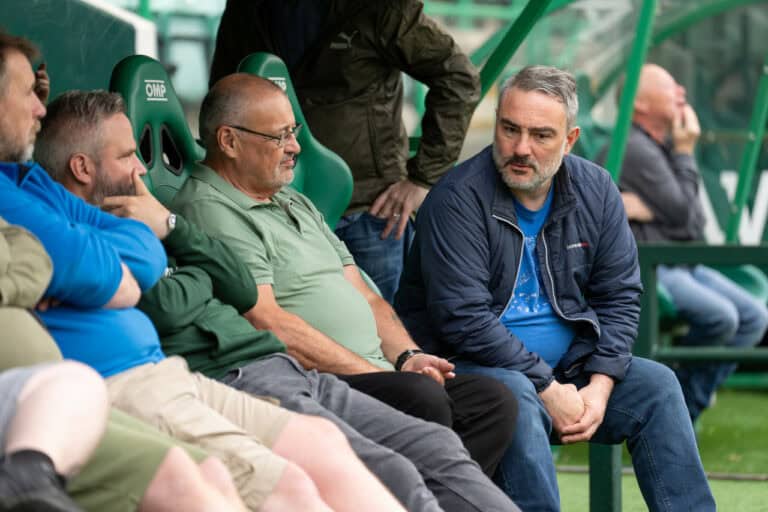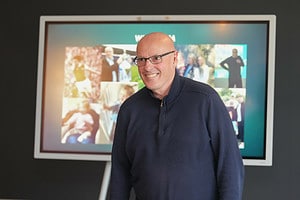
Run by Hibs Community Foundation volunteers who have completed the 12-week SAMH Changing Room sessions at Easter Road, ‘Supporting Our Supporters’ is one of the Foundation’s diverse range of community outreach programmes. Held on the last Monday of every month, July’s SOS event was particularly memorable for welcoming Brian McDermott as the guest speaker.
In May, Brian was appointed Director of Football at Hibs. After four decades as a professional footballer, manager, and scout, he had also begun building a strong reputation for delivering inspirational talks about coping with his own mental health. The Foundation approached him about the possibility of making a presentation at a future SOS drop-in. Given his day job of managing the pre-season transfers, it was assumed this might occur sometime later in the year. All were delighted when Brian agreed to speak at the July SOS drop-in. On the night, the sizeable audience included HCF volunteers and other regular SOS attendees, current Changing Room participants and SAMH coaches.
Brian thanked Head of Community, Lewis Melee, for teeing up the slideshow, then proceeded with his forthright presentation. He spoke at length about his career in professional football, playing for Arsenal, Oxford United, Cardiff City, Exeter City, Yeovil Town, and others, then managing Leeds United, but most successfully, Reading. He led the Royals to the FA Cup Quarterfinal twice, famously knocking out Liverpool at Anfield in 2010, and Everton at Goodison Park a year later. In 2012, following a tremendous run of 15 wins out of 17, he earned Reading promotion to the Premier League for only the second time in the club’s history.
For all the highs in his professional career, Brian was candid about the lows. He showed clips of Reading losing the 2011 Championship play-off final to Swansea City, as well as himself as an Arsenal player with just Grobbelaar to beat in front of The Kop, only for an internal voice to tell him he was going to put it wide. Which he did. Despite being known as ‘Brian the footballer’ from an early age, he was open about the low self-esteem that constantly dogged him. Born in Slough, Berkshire to Irish parents, Brian spoke of the far-reaching impact of a decision he made in 1979 as a 17-year-old Arsenal midfielder. Internationally, it was Ireland or England. He chose the country of his birth, representing England at a youth tournament. “I felt a complete imposter … a complete traitor, and I felt like that for years and years and years.” This sparked a lifelong struggle with what he called ‘imposter syndrome,’ wracked with self-doubt that created a ‘black hole’ inside. He discovered the only way to fill this void was with alcohol.

Brian also admitted living with debilitating mental health issues, tracing these to asking for help as a teenager (and not receiving it), then not reaching out again until 2018. At that point he decided to stop drinking altogether and is now reliant on a mentor while thriving on mentoring others and, crucially, telling his story.
After this eye-opening talk, the audience asked many questions. Did he ever dwell on his past? He did look back but never stared. Nor did he ever look too far forward. He lived for the moment, devoted to his family, especially his young granddaughter, and full of enthusiasm for his new vocation at Easter Road. What advice could he give to a young audience member who said he sometimes struggled? Find someone to talk to.
Brian said he regarded it as a privilege when anyone reached out to him, and you should never feel reluctant or embarrassed about asking for help. He still had days when he felt low and might be tempted to drink again. But he knew what he had to lose and would always choose to pick up his phone, reaching out when he needed to. What had drawn him to Hibs? He was impressed by the club’s vibrant community spirit. Indeed, this sense of community was a topic he reinforced. Where his Director of Football role was concerned, he was interested in signing people, not players. He described the importance of team players – and he had known several ‘diamonds’ during his career – guys who gave their all in each game, and who could lift a dressing room.
In conclusion, he stated how passionate he was about creating a unified community within the club, where players, fans, and staff, were one – sentiments which have long been core values of the Foundation. Everyone left the Famous Five Stand function rooms feeling uplifted by Brian’s powerful story.
Words by Mark Fleming.
Hibernian Community Foundation
Easter Road Stadium, 12 Albion Place,
Edinburgh EH7 5QG
Scottish Registered Charity No SC 039699
and registered in Scotland as a Company Limited by Guarantee No SC 345199
© Hibernian Community Foundation – Website by Hype
